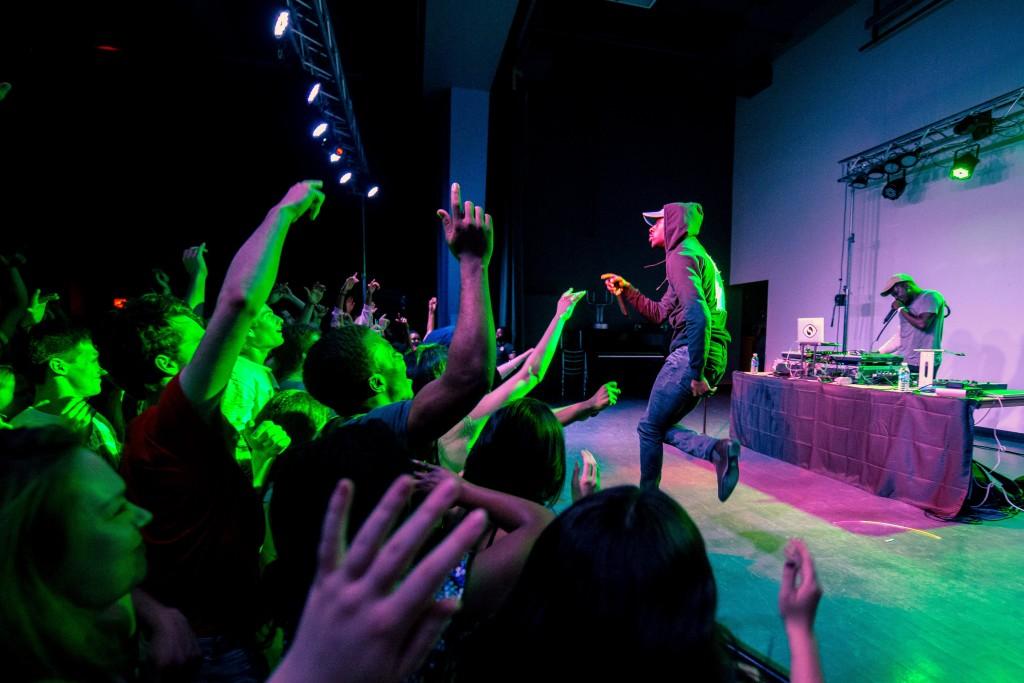Harris Dances in limbo until ACESS alternative is found
Artist GoldLink performed in Harris Concert Hall on May 6, 2016. Following a hiatus due to the pandemic, Harrises returned last semester, but may now be at risk once again.
September 12, 2022
The dissolution of the All-Campus Events Student Safety (ACESS) staff over equity concerns has put the immediate future of Harris dances in jeopardy. Due to student safety concerns regarding a lack of ACESS at the dances, the initial Student Government Association (SGA) Harris Dance, scheduled for Sept. 3 and publicized by the Division of Student Affairs, was postponed, and future dances may face the same possibility.
Harris Dances are popular all-campus events funded by the SGAs All-Campus Events (ACE) committee. This committee handles events that are open to all students on campus like concerts in Gardner, Harris parties and other events not connected to a specific student group.
Traditionally, “Harrises” have been hosted by different student groups on campus who propose the theme, plan the dance and decorate Harris Concert Hall. The event would then take place with the ACESS overseeing the event to ensure student safety.
However, ethics and equity concerns arose regarding the predominance of students of color working as ACESS, and the fact hat these students were unable to participate and enjoy the events. As a result, Natalia Ramirez `24, All Campus Events Chair, said she is searching for alternatives to the position.
“ACESS were predominantly people of color who needed to work and could not attend the events.” Ramirez said. “The Division of Student Affairs have agreed that we don’t want ACESS anymore. We don’t want a role that reinforces a racist system, so we need to find a replacement for that system.”
ACESS staff were typically responsible for providing a layer of assurance and safety to students when attending All-Campus Events, as their job ensured that a sober student would be available to provide attendees assistance if needed, particularly regarding possible sexual misconduct. The ACE committee is exploring several potential options to address the new vacancy and has opted to postpone this semester’s first Harris event until a sustainable alternative has been found.
“The option that we are leaning towards is having people who are hosting the events volunteer to help secure the students and help with sexual misconduct and harassment that we don’t want happening at Harrises,” said Ramirez.
Presently, no student organizations have offered to host the Harris event scheduled for Sept. 16, opening the possibility for another postponement. Concerns have been raised that student groups may be less eager to host knowing that several of their members would not be able to engage in the festivities.
“With all the student groups that I have been talking to, I’m telling them that we need a security system and that we’ll probably need your student members to help us with that,” Ramirez said. “They’re usually less excited, like ‘oh, wait a minute.’ Then, that student group doesn’t want to host anymore.”
Using alternatives like Campus Security or a professional bouncer both risk jeopardizing student comfort, especially in the case of marginalized students. Although using student volunteers is a potential alternative, training typically consists of one hour of training added to attendance for the full duration of the event. These students would miss the opportunity to enjoy the Harris party to its fullest and would not be compensated for their service.
“It would be the same. Volunteers would have to attend training, not attend the Harris, and not get paid,” Ramirez said. “We still don’t have anyone who is willing to host so that we can start the actual organizing and planning. Until we find a solution, it’s unlikely that we’ll see a Harris party soon.”



















































